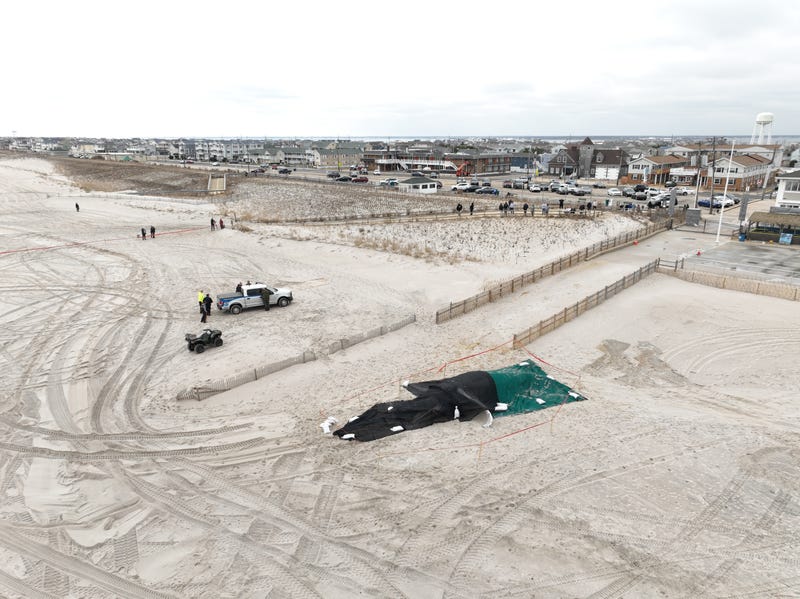
PHILADELPHIA (KYW Newsradio) — Over the past few months, there has been an unusual amount of dead marine animals washing up on the Jersey Shore.
A dead dolphin washed ashore in Avalon on Feb. 27 — the fourth one that has washed up in New Jersey within about a week and a half timeframe.
Over the past few months, more than a dozen dead whales have washed up along the New York and New Jersey coasts, including Atlantic City, Strathmere and North Brigantine.

Sheila Dean, director of the Marine Mammal Stranding Center in Brigantine, said officials investigate the cause of each death, but they don’t always get a definitive answer.
“This is what’s called an unusual mortality event,” she said. “It’s a shame. … They are a federally protected endangered animal.”
These deaths aren’t limited to the East Coast either. Off the shore of Alaska, billions of snow crabs disappeared this season.
So, what is happening in our oceans? Did humans somehow cause this, and should we be concerned?
Part of the whale problem starts with the population itself. While humans have made significant strides in reviving the population, the majority of whales that are stranding are ones that are in bigger groups, according to Villanova University biology professor Dr. Samantha Chapman.
“If we’re just going to play the odds, we’re going to see more of this happening because there are just more whales out there,” she said. “At the same time, humans are spending so much more time in the nearshore ocean than we would have done previously. And so we’re encountering the whales much more.”
More instances of whale strikes and vessel interactions could be putting stress on the whales and causing them to strand. But there’s still a lot that we don’t scientifically know.
“We don’t really have a good idea of what some of the impacts are in that local area off the coast of New Jersey, New York, Rhode Island, in the Northeast, associated with the offshore winds that are going on,” said Chapman. “There’s a lot of uncertainty. The certainty is, there are lots of whales in the water in that part of the world. And so it’s not that surprising that we’re seeing strandings happen.”
Some environmentalists have speculated that the increase in offshore wind turbines — which provide renewable energy to large populations — may be to blame for the whale strandings. Chapman said it’s not likely.
“Right now, the science says that that’s very, very unlikely. The investigations that they do to secure new locations for each individual turbine do create some noise underwater. But part of the regulation of having that in place, they have to have spotter boats that are adjacent to things that are drilling,” she explained. “And there are people on board whose only role in the whole process is to watch for whales and other large mammals … it’s unlikely that [offshore winds] are having a negative impact.”
If offshore winds were creating a problem, oil and gas drilling in the Gulf of Mexico would have just as much of an impact, she noted, and that’s just not happening.
Chapman said it’s also possible that the migration routes of the whales are shifting because of climate change. “The signals that they’re using to swim north or swim south, based on temperature, are adjusting, so the pathways that they’re taking may be slightly different than they used to be historically.
“If we were able to use more renewable energy, we could reduce our carbon footprint, we could maybe have a more positive impact on our CO2 emissions, and maybe have an impact on that temperature change. So really, I think it could only be positive for the whales if we have more wind available.”
The studies that have been done on wind farms — admittedly few, she noted — don’t show that kind of negative impact.
Some oil and gas companies use air guns that make louder noises than what would be used in a wind farm, added Dr. Lisa Rodrigues, Villanova associate professor of environmental science.
Plus, the addition of wind energy only reduces the likelihood of oil spills in the ocean, which are obviously detrimental to whales and other marine life.
“The chances of wind energy being problematic for whales is a distraction,” she added.
Dr. Chapman and Dr. Rodrigues also discussed what’s happening with the disappearing snow crabs and how we can help marine life. Listen to the full conversation on this episode of KYW Newsradio In Depth in the player below or wherever you get your podcasts:




